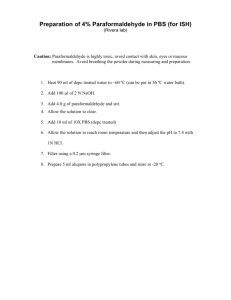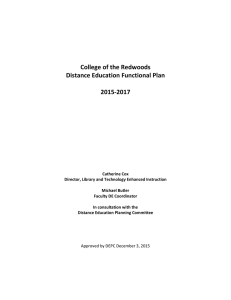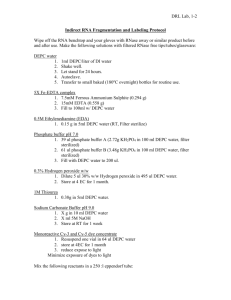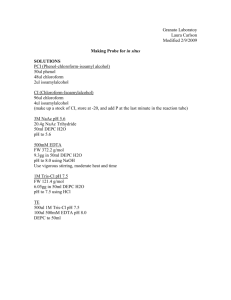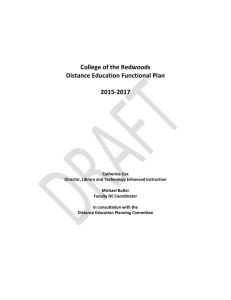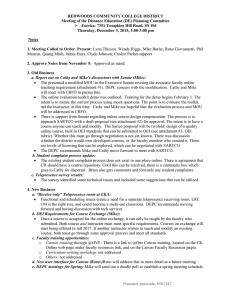REDWOODS COMMUNITY COLLEGE DISTRICT Meeting Called to Order.
advertisement
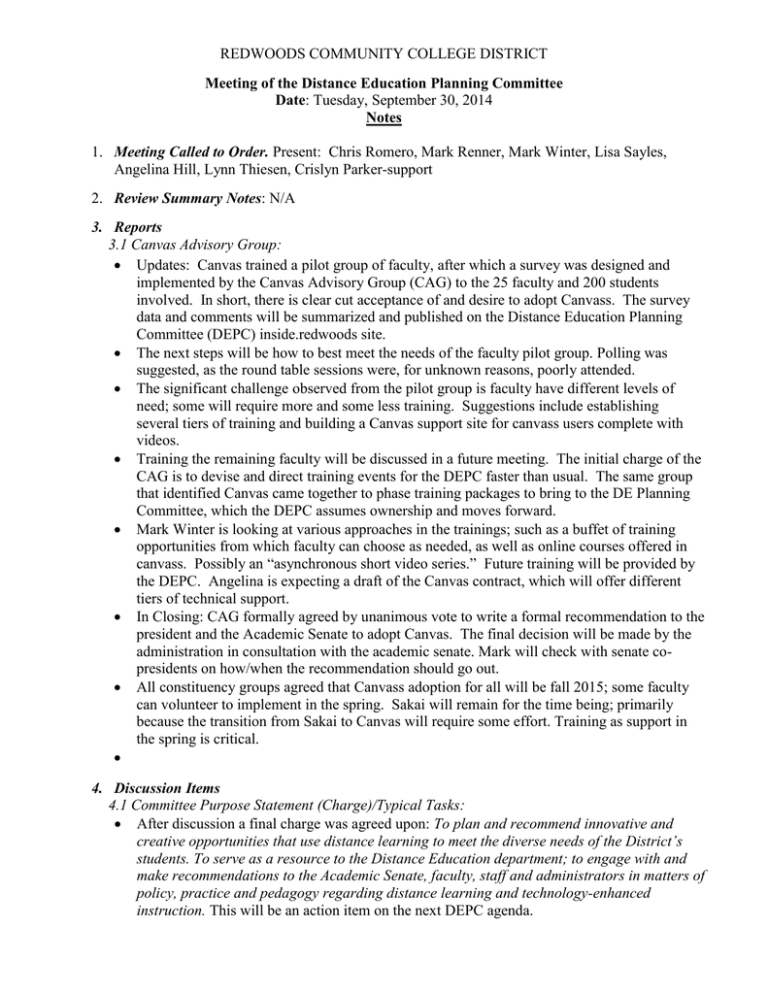
REDWOODS COMMUNITY COLLEGE DISTRICT Meeting of the Distance Education Planning Committee Date: Tuesday, September 30, 2014 Notes 1. Meeting Called to Order. Present: Chris Romero, Mark Renner, Mark Winter, Lisa Sayles, Angelina Hill, Lynn Thiesen, Crislyn Parker-support 2. Review Summary Notes: N/A 3. Reports 3.1 Canvas Advisory Group: Updates: Canvas trained a pilot group of faculty, after which a survey was designed and implemented by the Canvas Advisory Group (CAG) to the 25 faculty and 200 students involved. In short, there is clear cut acceptance of and desire to adopt Canvass. The survey data and comments will be summarized and published on the Distance Education Planning Committee (DEPC) inside.redwoods site. The next steps will be how to best meet the needs of the faculty pilot group. Polling was suggested, as the round table sessions were, for unknown reasons, poorly attended. The significant challenge observed from the pilot group is faculty have different levels of need; some will require more and some less training. Suggestions include establishing several tiers of training and building a Canvas support site for canvass users complete with videos. Training the remaining faculty will be discussed in a future meeting. The initial charge of the CAG is to devise and direct training events for the DEPC faster than usual. The same group that identified Canvas came together to phase training packages to bring to the DE Planning Committee, which the DEPC assumes ownership and moves forward. Mark Winter is looking at various approaches in the trainings; such as a buffet of training opportunities from which faculty can choose as needed, as well as online courses offered in canvass. Possibly an “asynchronous short video series.” Future training will be provided by the DEPC. Angelina is expecting a draft of the Canvas contract, which will offer different tiers of technical support. In Closing: CAG formally agreed by unanimous vote to write a formal recommendation to the president and the Academic Senate to adopt Canvas. The final decision will be made by the administration in consultation with the academic senate. Mark will check with senate copresidents on how/when the recommendation should go out. All constituency groups agreed that Canvass adoption for all will be fall 2015; some faculty can volunteer to implement in the spring. Sakai will remain for the time being; primarily because the transition from Sakai to Canvas will require some effort. Training as support in the spring is critical. 4. Discussion Items 4.1 Committee Purpose Statement (Charge)/Typical Tasks: After discussion a final charge was agreed upon: To plan and recommend innovative and creative opportunities that use distance learning to meet the diverse needs of the District’s students. To serve as a resource to the Distance Education department; to engage with and make recommendations to the Academic Senate, faculty, staff and administrators in matters of policy, practice and pedagogy regarding distance learning and technology-enhanced instruction. This will be an action item on the next DEPC agenda. Discussion on how the DEPC fits in to the planning model: Angelina sees the DEPC working with DE in completing program review; reflect resources aspects and approve software. It was discussed and agreed that the DEPC will assist in planning and implementing. It was discussed with Lynn Thiesen that the language in the charge is broad enough to encompass student development and financial aid needs and implies collaboration. The committee membership and terms, purpose, and tasks will be a future agenda item. Agendas and minutes will be posted on the inside.redwoods site. 4.2 Online Teaching and Learning Training (OTLT) Draft: An MOU stipulates faculty who have taught online course(s) will be grandfathered in; faculty new to online teaching will be required to take in-house training provided by the DEPC. Mark has developed a draft Online Teaching and Learning Training (OTLT) format. Four questions to which Mark would like the DEPC to respond: 1. What does the DEPC see our role in relationship to the technical specialist and DE department? Mark W. feels his role is to draft training content, bring to the DEPC to set parameters and standards; modify and submit to the Academic Senate for feedback. 2. When evaluating faculty on assessments, do we want tight correlation to the @One standards? The OTLT is designed around the nine @One standards. Mark would like policies, procedures and practices to be known to all faculty. A rubric evaluation schedule F2DE will be embedded in the training; retro effective contact will be built-in. Evaluations/Competencies will be assessments of candidates going through the training, using a variety of assessment mechanisms for trainers to determine how well candidates are obtaining the materials. Part of the training will be to design a class (module) which can be fictitious or based on the faculty member’s class. 3. What are the parameters for total training hours? After discussion, the committee agreed on four weeks for a total of 40 hours. 4. Modality training: online or in-seat? The goal of this training is to evolve to being completely online and done in Canvas. Discussion included the possibility of establishing this training as a CR non-credit course. Once the class is built and sustainable, the instructional technologist can run the class. Another plus, a class could be shared with other faulty who can work together (a mentor group). Next meeting, Mark will have a 4-week course rough draft, including a lab/practicum. Trainees will be unable to move to standard 2, until standard 1 is complete. Mark hopes to have, at least a bare bones, class available this semester. The DEPC will build a rubric for assessment and attainment level for what is considered passing (course objectives that need to be met?). 5. Action Items 6. Future Agenda items 6.1 Review ACCJC matrix for DEC; members of DEPC attending conferences on regular basis; course draft; Action Item: charge statement; how to incentivize this training beyond the scope of the CRFO MOU. 7. Announcements: After discussion, it was agreed future meetings will be held on the 2nd and 4th Tuesdays, from 3p – 4:30p 8. Adjourn
